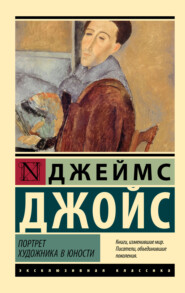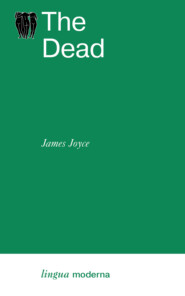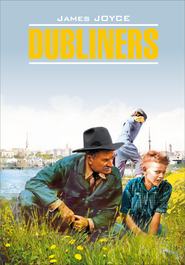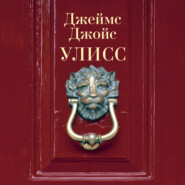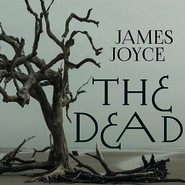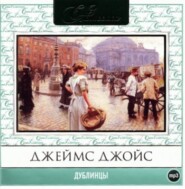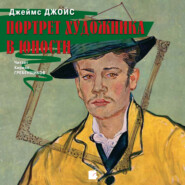По всем вопросам обращайтесь на: info@litportal.ru
(©) 2003-2025.
✖
A Portrait of the Artist as a Young Man / Портрет художника в юности
Настройки чтения
Размер шрифта
Высота строк
Поля
During the first part of the summer in Blackrock uncle Charles was Stephen's constant companion. Uncle Charles was a hale old man with a well tanned skin, rugged features and white side whiskers. On week days he did messages between the house in Carysfort Avenue and those shops in the main street of the town with which the family dealt. Stephen was glad to go with him on these errands for uncle Charles helped him very liberally to handfuls of whatever was exposed in open boxes and barrels outside the counter. He would seize a handful of grapes and sawdust or three or four American apples and thrust them generously into his grandnephew's hand while the shopman smiled uneasily; and, on Stephen's feigning reluctance to take them, he would frown and say:
– Take them, sir. Do you hear me, sir? They're good for your bowels.
When the order list had been booked the two would go on to the park where an old friend of Stephen's father, Mike Flynn, would be found seated on a bench, waiting for them. Then would begin Stephen's run round the park. Mike Flynn would stand at the gate near the railway station, watch in hand, while Stephen ran round the track in the style Mike Flynn favoured, his head high lifted, his knees well lifted and his hands held straight down by his sides. When the morning practice was over the trainer would make his comments and sometimes illustrate them by shuffling along for a yard or so comically in an old pair of blue canvas shoes. A small ring of wonderstruck children and nursemaids would gather to watch him and linger even when he and uncle Charles had sat down again and were talking athletics and politics. Though he had heard his father say that Mike Flynn had put some of the best runners of modern times through his hands Stephen often glanced at his trainer's flabby stubble-covered face, as it bent over the long stained fingers through which he rolled his cigarette, and with pity at the mild lustreless blue eyes which would look up suddenly from the task and gaze vaguely into the blue distance while the long swollen fingers ceased their rolling and grains and fibres of tobacco fell back into the pouch.
On the way home uncle Charles would often pay a visit to the chapel and, as the font was above Stephen's reach, the old man would dip his hand and then sprinkle the water briskly about Stephen's clothes and on the floor of the porch. While he prayed he knelt on his red handkerchief and read above his breath from a thumb blackened prayerbook wherein catchwords were printed at the foot of every page. Stephen knelt at his side respecting, though he did not share, his piety. He often wondered what his granduncle prayed for so seriously. Perhaps he prayed for the souls in purgatory or for the grace of a happy death or perhaps he prayed that God might send him back a part of the big fortune he had squandered in Cork.
On Sundays Stephen with his father and his granduncle took their constitutional. The old man was a nimble walker in spite of his corns and often ten or twelve miles of the road were covered. The little village of Stillorgan was the parting of the ways. Either they went to the left towards the Dublin mountains or along the Goatstown road and thence into Dundrum, coming home by Sandyford. Trudging along the road or standing in some grimy wayside public house his elders spoke constantly of the subjects nearer their hearts, of Irish politics, of Munster and of the legends of their own family, to all of which Stephen lent an avid ear. Words which he did not understand he said over and over to himself till he had learnt them by heart: and through them he had glimpses of the real world about them. The hour when he too would take part in the life of that world seemed drawing near and in secret he began to make ready for the great part which he felt awaited him the nature of which he only dimly apprehended.
His evenings were his own; and he pored over a ragged translation of The Count of Monte Cristo. The figure of that dark avenger stood forth in his mind for whatever he had heard or divined in childhood of the strange and terrible. At night he built up on the parlour table an image of the wonderful island cave out of transfers and paper flowers and coloured tissue paper and strips of the silver and golden paper in which chocolate is wrapped. When he had broken up this scenery, weary of its tinsel, there would come to his mind the bright picture of Marseilles, of sunny trellises and of Mercedes.
Outside Blackrock, on the road that led to the mountains, stood a small whitewashed house in the garden of which grew many rosebushes: and in this house, he told himself, another Mercedes lived. Both on the outward and on the homeward journey he measured distance by this landmark: and in his imagination he lived through a long train of adventures, marvellous as those in the book itself, towards the close of which there appeared an image of himself, grown older and sadder, standing in a moonlit garden with Mercedes who had so many years before slighted his love, and with a sadly proud gesture of refusal, saying:
– Madam, I never eat muscatel grapes.
He became the ally of a boy named Aubrey Mills and founded with him a gang of adventurers in the avenue. Aubrey carried a whistle dangling from his buttonhole and a bicycle lamp attached to his belt while the others had short sticks thrust daggerwise through theirs. Stephen, who had read of Napoleon's plain style of dress, chose to remain unadorned and thereby heightened for himself the pleasure of taking counsel with his lieutenant before giving orders. The gang made forays into the gardens of old maids or went down to the castle and fought a battle on the shaggy weedgrown rocks, coming home after it weary stragglers with the stale odours of the foreshore in their nostrils and the rank oils of the seawrack upon their hands and in their hair.
Aubrey and Stephen had a common milkman and often they drove out in the milkcar to Carrickmines where the cows were at grass. While the men were milking the boys would take turns in riding the tractable mare round the field. But when autumn came the cows were driven home from the grass: and the first sight of the filthy cowyard at Stradbrook with its foul green puddles and clots of liquid dung and steaming bran troughs, sickened Stephen's heart. The cattle which had seemed so beautiful in the country on sunny days revolted him and he could not even look at the milk they yielded.
The coming of September did not trouble him this year for he was not to be sent back to Clongowes. The practice in the park came to an end when Mike Flynn went into hospital. Aubrey was at school and had only an hour or two free in the evening. The gang fell asunder and there were no more nightly forays or battles on the rocks. Stephen sometimes went round with the car which delivered the evening milk: and these chilly drives blew away his memory of the filth of the cowyard and he felt no repugnance at seeing the cow hairs and hayseeds on the milkman's coat. Whenever the car drew up before a house he waited to catch a glimpse of a well scrubbed kitchen or of a softly lighted hall and to see how the servant would hold the jug and how she would close the door. He thought it should be a pleasant life enough, driving along the roads every evening to deliver milk, if he had warm gloves and a fat bag of gingernuts in his pocket to eat from. But the same foreknowledge which had sickened his heart and made his legs sag suddenly as he raced round the park, the same intuition which had made him glance with mistrust at his trainer's flabby stubblecovered face as it bent heavily over his long stained fingers, dissipated any vision of the future. In a vague way he understood that his father was in trouble and that this was the reason why he himself had not been sent back to Clongowes. For some time he had felt the slight change in his house; and those changes in what he had deemed unchangeable were so many slight shocks to his boyish conception of the world. The ambition which he felt astir at times in the darkness of his soul sought no outlet. A dusk like that of the outer world obscured his mind as he heard the mare's hoofs clattering along the tramtrack on the Rock Road and the great can swaying and rattling behind him.
He returned to Mercedes and, as he brooded upon her image, a strange unrest crept into his blood. Sometimes a fever gathered within him and led him to rove alone in the evening along the quiet avenue. The peace of the gardens and the kindly lights in the windows poured a tender influence into his restless heart. The noise of children at play annoyed him and their silly voices made him feel, even more keenly than he had felt at Clongowes, that he was different from others. He did not want to play. He wanted to meet in the real world the unsubstantial image which his soul so constantly beheld. He did not know where to seek it or how but a premonition which led him on told him that this image would, without any overt act of his, encounter him. They would meet quietly as if they had known each other and had made their tryst, perhaps at one of the gates or in some more secret place. They would be alone, surrounded by darkness and silence: and in that moment of supreme tenderness he would be transfigured. He would fade into something impalpable under her eyes and then in a moment, he would be transfigured. Weakness and timidity and inexperience would fall from him in that magic moment.
Two great yellow caravans had halted one morning before the door and men had come tramping into the house to dismantle it. The furniture had been hustled out through the front garden which was strewn with wisps of straw and rope ends and into the huge vans at the gate. When all had been safely stowed the vans had set off noisily down the avenue: and from the window of the railway carriage, in which he had sat with his redeyed mother, Stephen had seen them lumbering along the Merrion Road.
The parlour fire would not draw that evening and Mr Dedalus rested the poker against the bars of the grate to attract the flame. Uncle Charles dozed in a corner of the half furnished uncarpeted room and near him the family portraits leaned against the wall. The lamp on the table shed a weak light over the boarded floor, muddied by the feet of the vanmen. Stephen sat on a footstool beside his father listening to a long and incoherent monologue. He understood little or nothing of it at first but he became slowly aware that his father had enemies and that some fight was going to take place. He felt, too, that he was being enlisted for the fight, that some duty was being laid upon his shoulders. The sudden flight from the comfort and reverie of Blackrock, the passage through the gloomy foggy city, the thought of the bare cheerless house in which they were now to live made his heart heavy: and again an intuition, a foreknowledge of the future came to him. He understood also why the servants had often whispered together in the hall and why his father had often stood on the hearthrug, with his back to the fire, talking loudly to uncle Charles who urged him to sit down and eat his dinner.
– There's a crack of the whip left in me yet, Stephen, old chap, said Mr Dedalus, poking at the dull fire with fierce energy. We're not dead yet, sonny. No, by the Lord Jesus (God forgive me) nor half dead.
Dublin was a new and complex sensation. Uncle Charles had grown so witless that he could no longer be sent out on errands and the disorder in settling in the new house left Stephen freer than he had been in Blackrock. In the beginning he contented himself with circling timidly round the neighbouring square or, at most, going half way down one of the side streets but when he had made a skeleton map of the city in his mind he followed boldly one of its central lines until he reached the Custom House. He passed unchallenged among the docks and along the quays wondering at the multitude of corks that lay bobbing on the surface of the water in a thick yellow scum, at the crowds of quay porters and the rumbling carts and the illdressed bearded policeman. The vastness and strangeness of the life suggested to him by the bales of merchandise stocked along the walls or swung aloft out of the holds of steamers wakened again in him the unrest which had sent him wandering in the evening from garden to garden in search of Mercedes. And amid this new bustling life he might have fancied himself in another Marseilles but that he missed the bright sky and the sun-warmed trellises of the wineshops. A vague dissatisfaction grew up within him as he looked on the quays and on the river and on the lowering skies and yet he continued to wander up and down day after day as if he really sought someone that eluded him.
He went once or twice with his mother to visit their relatives: and though they passed a jovial array of shops lit up and adorned for Christmas his mood of embittered silence did not leave him. The causes of his embitterment were many, remote and near. He was angry with himself for being young and the prey of restless foolish impulses, angry also with the change of fortune which was reshaping the world about him into a vision of squalor and insincerity. Yet his anger lent nothing to the vision. He chronicled with patience what he saw, detaching himself from it and tasting its mortifying flavour in secret.
He was sitting on the backless chair in his aunt's kitchen. A lamp with a reflector hung on the japanned wall of the fireplace and by its light his aunt was reading the evening paper that lay on her knees. She looked a long time at a smiling picture that was set in it and said musingly:
– The beautiful Mabel Hunter!
A ringletted girl stood on tiptoe to peer at the picture and said softly:
– What is she in, mud?
– In a pantomime, love.
The child leaned her ringletted head against her mother's sleeve, gazing on the picture and murmured as if fascinated:
– The beautiful Mabel Hunter!
As if fascinated, her eyes rested long upon those demurely taunting eyes and she murmured devotedly:
– Isn't she an exquisite creature?
And the boy who came in from the street, stamping crookedly under his stone of coal, heard her words. He dropped his load promptly on the floor and hurried to her side to see. He mauled the edges of the paper with his reddened and blackened hands, shouldering her aside and complaining that he could not see.
He was sitting in the narrow breakfast room high up in the old darkwindowed house. The firelight flickered on the wall and beyond the window a spectral dusk was gathering upon the river. Before the fire an old woman was busy making tea and, as she bustled at the task, she told in a low voice of what the priest and the doctor had said. She told too of certain changes they had seen in her of late and of her odd ways and sayings. He sat listening to the words and following the ways of adventure that lay open in the coals, arches and vaults and winding galleries and jagged caverns.
Suddenly he became aware of something in the doorway. A skull appeared suspended in the gloom of the doorway. A feeble creature like a monkey was there, drawn thither by the sound of voices at the fire. A whining voice came from the door asking:
– Is that Josephine?
The old bustling woman answered cheerily from the fireplace:
– No, Ellen, it's Stephen.
– O… O, good evening, Stephen.
He answered the greeting and saw a silly smile break over the face in the doorway.
– Do you want anything, Ellen? asked the old woman at the fire.
But she did not answer the question and said:
– I thought it was Josephine. I thought you were Josephine, Stephen.
And, repeating this several times, she fell to laughing feebly.
He was sitting in the midst of a children's party at Harold's Cross. His silent watchful manner had grown upon him and he took little part in the games. The children, wearing the spoils of their crackers, danced and romped noisily and, though he tried to share their merriment, he felt himself a gloomy figure amid the gay cocked hats and sunbonnets.
But when he had sung his song and withdrawn into a snug corner of the room he began to taste the joy of his loneliness. The mirth, which in the beginning of the evening had seemed to him false and trivial, was like a soothing air to him, passing gaily by his senses, hiding from other eyes the feverish agitation of his blood while through the circling of the dancers and amid the music and laughter her glance travelled to his corner, flattering, taunting, searching, exciting his heart.
In the hall the children who had stayed latest were putting on their things: the party was over. She had thrown a shawl about her and, as they went together towards the tram, sprays of her fresh warm breath flew gaily above her cowled head and her shoes tapped blithely on the glassy road.
It was the last tram. The lank brown horses knew it and shook their bells to the clear night in admonition. The conductor talked with the driver, both nodding often in the green light of the lamp. On the empty seats of the tram were scattered a few coloured tickets. No sound of footsteps came up or down the road. No sound broke the peace of the night save when the lank brown horses rubbed their noses together and shook their bells.
Вы ознакомились с фрагментом книги.
Приобретайте полный текст книги у нашего партнера:
Приобретайте полный текст книги у нашего партнера:







